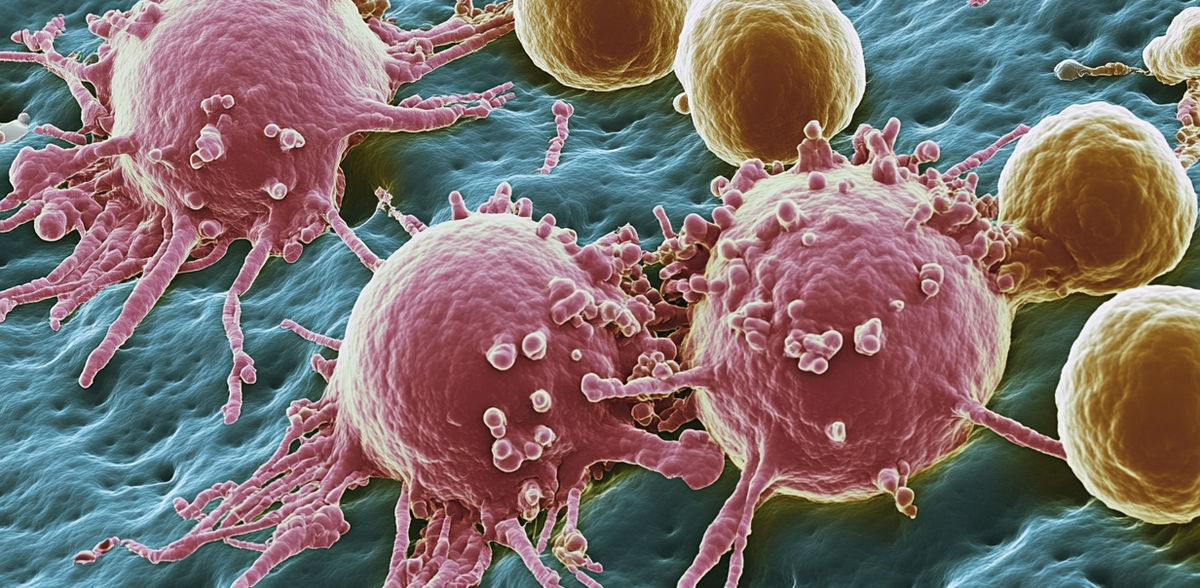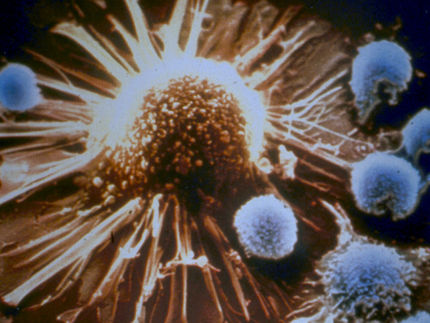Skin cancer: mode of action of combination immunotherapy decoded
Why a long-established combination therapy against black skin cancer works better than the individual active ingredients
Advertisement
A study by the University Medical Center Freiburg shows why certain combined immunotherapies can help patients with advanced skin cancer particularly well. The two immune checkpoint therapies prevent the tumor from switching off the immune cells. As the Freiburg researchers have now been able to show for the first time, the IL-21 signaling pathway plays a decisive role here, as it activates essential immune cells more strongly and in a more targeted manner. The study was published on December 19, 2024 in the journal Nature Immunology . The findings now offer the possibility of specifically expanding other cancer therapies to include this immune activation and thus strengthen cancer therapies.
"Our results are an important step towards improving the success of immunotherapy for malignant melanoma and transferring it to other types of cancer. We were able to show that the activation of the IL-21 signaling pathway is crucial for the success of combination therapy," says Prof. Dr. Dr. Bertram Bengsch, head of the study and senior physician at the Department of Internal Medicine II at the Freiburg University Medical Center. "This mechanism contributes significantly to the fact that patients with skin cancer develop a stronger immune response under combination therapy and thus achieve better survival rates," says Bengsch, who is also a member of the Cluster of Excellence CIBSS - Center for Integrative Biological Signalling Studies at the University of Freiburg and the German Consortium for Translational Cancer Research in Freiburg.
Patients' immune systems put the researchers on the right track
In the study, the immune system of patients with advanced malignant melanoma was examined at the Skin Tumor Center of the University Medical Center Freiburg (Head: PD Dr. Frank Meiß). The patients received medication from the group of immune checkpoint inhibitors: either as monotherapy with the active substance anti-PD-1 or in a double immunotherapy of the inhibitors anti-CTLA-4 and anti-PD-1. The researchers found that the anti-CTLA-4 therapy strengthened a signaling pathway in the patients' immune cells that is caused by the messenger substance IL-21. This reprogrammed exhausted immune CD8 T cells so that they were able to intervene in the fight against the tumor.
Communication between different immune cell types key to success
"It is exciting that there is an indirect mechanism here," says Bengsch. For example, anti-CTLA-4 therapy increases the production of IL-21 by so-called helper T cells and can thus have an effect on the CD8 T cells. If this communication is prevented, there is no longer any therapeutic effect. The researchers demonstrated this in a mouse model together with the working group of Prof. Dr. Robert Zeiser, Department of Internal Medicine I at the Freiburg University Medical Center.
Results offer new hope for patients with skin cancer
The results of the study show that the combination therapy not only triggers a quantitatively stronger immune response, but also leads to a qualitative change in the immune cells. These cells developed into cytotoxic effector cells that are able to fight tumor cells more effectively. "For patients with double immunotherapy, this probably means a better prognosis and longer survival," says Bengsch.
Outlook for future research
The scientists are now planning to investigate the role of the IL-21 signaling pathway in other types of cancer as well. In the long term, the findings could lead to new combination therapies that achieve even more effective results in immunotherapy. Further studies are needed to further decipher the exact mechanisms and optimize therapeutic approaches for different types of cancer.
Note: This article has been translated using a computer system without human intervention. LUMITOS offers these automatic translations to present a wider range of current news. Since this article has been translated with automatic translation, it is possible that it contains errors in vocabulary, syntax or grammar. The original article in German can be found here.
Original publication
Zhen Zhang, Marlene Langenbach, Sagar Sagar, Viktor Fetsch, Jonas Stritzker, Elizabeth Severa, Ke Meng, Frances Winkler, Nisha Rana, ... Robert Zeiser, Robert Thimme, Ramin S. Herati, Bertram Bengsch; "Efficacy of CTLA-4 checkpoint therapy is dependent on IL-21 signaling to mediate cytotoxic reprogramming of PD-1+CD8+ T cells"; Nature Immunology, 2024-12-19




























































